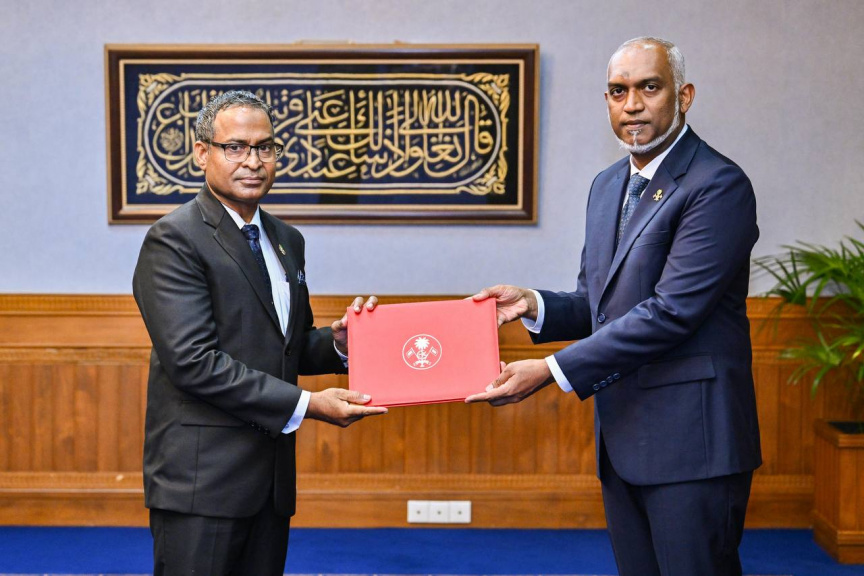
President Dr. Mohamed Muizzu (R) appoints Abdul Ghani Mohamed (L) as the Chief Justice on August 6, 2025. (Photo/President's Office)
President Dr. Mohamed Muizzu on Thursday announced the decision to introduce a block grant for the judiciary which will see greater government spending on the country’s justice system starting 2026 – a decision he said seeks to financially empower the judiciary and ascertain judicial independence.
In a post on X on Thursday morning, President Muizzu said that financial independence is crucial for courts to work free from influence.
He said that his cabinet decided on Wednesday to introduce major changes in the 2026 state budget, focused on granting the judiciary financial and administrative independence like never before.
According to President Muizzu, this involves disbursing a block grant to the judiciary under a specific set of rules that is equivalent to a specific percentage of the state’s projected annual revenue.
He did not specify the percentage that will be allocated for the block grant or provide details on the set of rules the money will be disbursed based on.
President Muizzu said the funds will be disbursed through a mechanism that allows the judiciary to operate with full financial independence.
“As such, we decided that the percentage will be one that is higher than the current budget ceiling for the judiciary. We have now initiated the legal, technical and systemic changes that this requires,” he said.
ޖުޑިޝަރީ މިނިވަންކަމާއެކު ފަންކްޝަންކުރުމަށް އެންމެ މުހިންމު ކަމަކީ މާލީ މިނިވަންކަން ލިބިގެންދިއުން ކަމަށްވާއިރު އެކަމަށް މަގުފަހިކުރުމަށްޓަކާ ކުރެވެމުންދާ ކަންކަމުގެ ތެރެއިން މާލީގޮތުންނާއި އިދާރީގޮތުން މިހާތަނަށް ނެތް މިނިވަންކަން މިއަންނަ އަހަރަށް ދައުލަތުން ފާސްކުރާ ބަޖެޓުން…
— Dr Mohamed Muizzu (@MMuizzu) September 11, 2025
Like all other Maldivian leaders before him, President Muizzu got elected to office with the promise to stop all government interference in the judiciary. During his 2023 inaugural speech, he famously declared that all influence over the judiciary had come to an immediate end “as of right this moment.”
ALLEGATIONS OF UNDERMINING MALDIVES' JUDICIAL INDEPENDENCE
The Maldives faces intense turmoil within its judiciary earlier this year, amid a Supreme Court course challenging controversial government-backed constitutional amendments.
On February 26, Supreme Court judges Dr. Azmiralda Zahir, Mahaz Ali Zahir and Husnu Al-Suood were suspended by the Judicial Service Commission (JSC), citing an ongoing investigation by the against them by the Anti-Corruption Commission (ACC). All three were hearing a case challenging the controversial move by the ruling People's National Congress (PNC) to write anti-defection clauses into the Maldivian constitution. It also came shortly after the ruling PNC used its supermajority in the Parliament to push through amendments to the Judicature Act to downsize the Supreme Court bench from seven to five justices - a bill that was later tabled following public backlash.
Suood resigned from the top court in protest of JSC’s decision, and the commission later opened misconduct cases against Azmiralda and Mahaz, accusing them of conspiring to influence the Criminal Court. Azmiralda and Mahaz - both of whom claim that the allegations against them are baseless and that the investigations by the JSC were tainted by the denial of due process to them - were dismissed by the Parliament with majority votes of 68-11 on May 14.
The case against the Supreme Court justices stemmed from the allegation that they exerted their influence over the Criminal Court to secure the release of Azmiralda’s husband, Dr. Ismail Latheef, an anesthesiologist, who was arrested during a police raid on a massage parlor in Male’. However, Criminal Court judge Ibrahim Zihunee’s statement to JSC shows Mahaz had called him after Latheef was already released from police custody.
Meanwhile, the then-assistant registrar of High Court, Hussain Mohamed Haneef, who testified against Azmiralda and Mahaz at the JSC, was recently appointed to a senior position at state-run utility company, Fenaka Corporation.
President Muizzu, whose administration has been accused of deliberately undermining the country’s judicial independence, denied these claims in a press briefing on May 3, describing the events that fueled the allegations as mere “coincidences.”
The JSC had come under fire from both local and international organizations over its decision to push for the dismissal of the Supreme Court justices. On June 4, multiple international bodies sent an open letter to President Muizzu urging him to suspend the impeachment of Supreme Court judges, citing reports of serious procedural concerns.
The then-Chief Justice Muthasim Adnan had remained silent throughout their suspension and dismissal, prompting many to question whether he was fulfilling his responsibilities as the Chief Justice. He had submitted a letter to the JSC amid the turmoil on May 8, informing the commission of his decision to retire. He formally retired on July 21, and was conferred Order of the Distinguished Rule of Izzuddin less than a week later, on July 27.